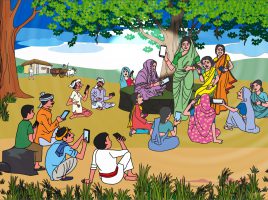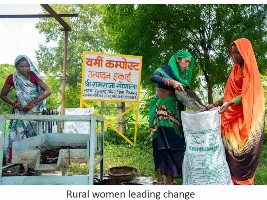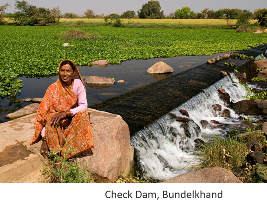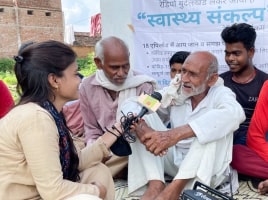Do women have to be rockstars to be celebrated?
We are putting a lot of pressure on women to shine, but are we really giving them the space and system to build their own empowerment stories?

In the 1990’s, there were many economists that were making the case for gender equality such as Amartya Sen who was famously quoted as saying, “Gender equality is not just a matter of social justice, but also a key driver of economic growth and development.” A recent report says Indian women contribute only 18% to GDP despite constituting 48% of the population. Advancing women’s equality could lead to a $28 trillion increase in global GDP, with India potentially seeing a $770 billion boost by 2025. Yet, within the vast landscape of India, a disheartening reality persists – a significant portion of women grapple with feelings of disempowerment.
As global dialogues on women’s empowerment gain momentum, it’s crucial to explore what empowerment truly means. Take, for instance, the story of Chanda Shukla, an e-rickshaw entrepreneur hailing from Mirzapur, Uttar Pradesh. For her, empowerment manifests in the form of economic agency – surpassing her husband’s earnings while dedicating fewer hours to work and balancing household responsibilities, thus emerging as a beacon of strength within her family and community. Yet, it’s crucial to recognise that not every woman follows the same trajectory. Empowerment is multifaceted, and its definition varies for each individual. As we navigate this complex terrain, we must strive to understand and amplify the diverse narratives that contribute to the fabric of women’s empowerment.
Across rural India, we are witnessing examples of women who are breaking the gender norms, questioning the status quo and making a place for themselves in decision making. Juggling between multiple roles, while doing a lot more than what they generally get credit for, women are naturally inclined to be resilient, excellent problem solvers and risk takers. These traits innately make women to be ‘entrepreneurial’ in nature. And once they do cross the threshold of being an entrepreneur, it gives them an opportunity to further build on these skills. Women entrepreneurs exhibit a readiness to step outside their comfort zones, embracing uncertainty and learning from successes and failures, while also adeptly adapting to dynamic conditions.
Development Alternatives’ extensive experience in entrepreneurship programmes has made it evident that improved representation of women in decision-making ‘nudges’ the system to better reflect their aspirations and needs and be more responsive to their economic and social empowerment. Our approach is based on the premise that including women in mainstream economic activities enables them to co-create entrepreneurship solutions that align with the needs and aspirations of the local community. This has enabled setting up of 15 enterprises per day across 7 districts of Uttar Pradesh, with at least 5 of them being women-led.
Communities, where we work, are seeing examples of breakthroughs in the form of enhanced women’s participation in the mainstream economic activities and women solving constraints such as restrained mobility. Solutions, co designed with women, along with access to enabling and future fit resources are making this possible.
These breakthroughs have empowered women to take charge as catalysts for change within the local economy. As women entrepreneurs, they are not only creating jobs but also emerging as serial entrepreneurs, generating numerous opportunities for livelihoods within their communities. Furthermore, there is clear evidence of women entrepreneurs hiring more men in their enterprises in our programme geographies, reflecting shifting dynamics of women’s empowerment and agency.
We have also seen women coming at the forefront of solving local challenges such as mobility, enabled by a solidarity network of 100+ women-led e-rickshaws. This network connects 100,000+ women and girls to schools, colleges, and healthcare facilities in Mirzapur and Bhadohi districts of Uttar Pradesh.
A critical enabler driving this change has been unlocking resources such as finance, for building an enabling environment for women to take up entrepreneurial opportunities. The focus has been on providing women with access to choices with customised credit solutions, shifting the bargaining power in the hands of women.
There has also been growing evidence of women leveraging 21st century resources, such as renewable energy and digital technology, as a means to achieve economic power. An example of this is the women-led Urja Mandala model, which demonstrates the catalytic role of renewable energy in the sustainable socio-economic growth of local communities, through productive use of reliable power. It has given a boost to women’s income and has empowered them and their institutions to be at the forefront of energy transition for micro-enterprises, enabling them to have a stronger role in the strengthening of the local economies.
Another significant breakthrough has been in the form of solidarity-based innovation, where women coming together, creating a network of solidarity, has empowered them to co-create solutions for local challenges. Women collectives have transformed into production facilities in the form of clusters, which act as a multiplication engine for enterprise development. Across India, DA has supported establishment of 30 clusters, including 8 women-only clusters, enabling livelihood for more than 70,000 individuals.
With women collectives being at the forefront of women-led enterprise development, providing an accelerated flow of resources, and placing the ownership of empowerment solutions in the hands of women’s institutions, especially Cluster Level Federations, will be pivotal in realising their full potential. In doing so, the women collectives can unlock entrepreneurship and boost the local economy, while building pathways for women to move beyond subsistence-based income-generating activities.
We strongly believe that the key to real transformation lies in creating systemic shifts that enable women to hold economic power. Chanda Shukla, is now a rockstar in her community, besides balancing household duties, she actively leads the women’s solidarity network- Aarya Manch. Moreover, she champions women empowerment by providing certified driving training, equipping fellow women entrepreneurs with essential skills. She has gained recognition for her efforts not just within her community but among the district level officials. Yet, must Chanda bear the burden of being a “rockstar”?
We are seeing a growing trend of initiatives supporting and celebrating exclusive women achievers, however, millions and millions of women will remain visibly invisible if we continue to expect them to break the glass ceiling. It’s time that we look at a system where all women are able to do what they want to do.
This women’s day, let’s not only celebrate the women who are breaking the glass ceiling but also spotlight the unsung women who are redefining ‘empowerment’ in their own ways.






Leave a Reply